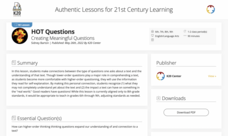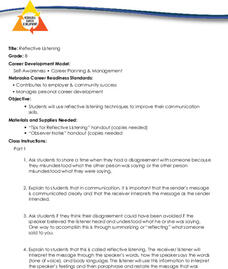Curated OER
"The Story of an Hour" Lesson 3: Teacher's Guide and Notes
The third instructional activity in "The Story of an Hour" series introduces young readers to analogies; a literary device writers use to add depth to their stories. Instructors identify the three analogies in the tale, and class members...
Curated OER
"The Story of an Hour" Lesson 2: Teacher's Guide and Notes
After reading background information about Kate Chopin, pupils complete their shared reading of her short story, "The Story of an Hour." Participants then consider the irony of the ending.
Curated OER
"The Story of an Hour" Lesson 1: Teacher's Guide and Notes
Attitudes toward women have changed radically in the last hundred years. The first lesson in a six-part unit that uses Kate Chopin's short story "The Story of an Hour" as an anchor text begins with a shared reading of "The Role of Women...
K20 LEARN
HOT Questions: Creating Meaningful Questions
Scholars examine a list of questions and sort them into corresponding groups based on similarities. A gallery walk allows peers to see how their peers sorted questions and leave notes. Costa's Level of Questions is the topic of a...
Overcoming Obstacles
Giving Presentations
With their action plans in place, groups now develop a presentation to get others interested in their project. Scholars learn how to present themselves during a presentation and elaborate on and add visuals to their presentation. After...
Overcoming Obstacles
Writing Reports
Following a review of how to research and take notes, scholars define the term paraphrase and identify ways to organize information and finish reports. To put their newfound knowledge to the test, learners interview a peer, take notes,...
Overcoming Obstacles
Using Appropriate Resources
A lesson dives deep into reference materials. The class begins with a discussion of which resources are best used for specific purposes and how to identify ways to get the needed information. Learners share information about the internet...
Overcoming Obstacles
Identifying Options
Making a decision can be more like a multiple-choice question than a yes/no one. Through a series of activities, middle schoolers learn how to consider and identify options, choices, and alternatives when faced with an important decision.
Overcoming Obstacles
Gathering Information
Before making important decisions, gathering as much information as possible is best. That's the take-away from the second lesson in the Decision-Making module of the Overcoming Obstacles course. Middle schoolers engage in a series of...
Overcoming Obstacles
Expressing Opinions Constructively
Everyone has opinions. The trick is to learn how to disagree in a way that doesn't cause problems. The activities in the final lesson in the Communication Module focuses on learning how to express opinions constructively. Middle...
Nebraska Department of Education
Reflective Listening
Reflective listening is not casual! After learning about the practice of reflective listening, middle schoolers practice reflective listening skills in a role play activity that has them take turns being a speaker, listener, and observer.
Academy of American Poets
The African American Experience
Disrespect can be as subtle as a frown or a turn of a head. To prepare for a study of Toi Derricote's poem "The Weakness" class members create wordless skits that demonstrate subtle or not so subtle signs of disrespect. After a...
British Council
What's Your Name?
What is your name? Scholars join in small groups to discuss questions about their names and listen to an audio about names before completing a worksheet. Afterward, individuals create a list of names heard in the audio and classify them...
British Council
Film Reviews
Scholars work in pairs to discuss a film they have both seen by answering 10 questions about the movie. They then individually work on a film review worksheet using a different film than the one previously discussed with a partner.
Franklin D. Roosevelt Presidential Library & Museum
What Does It Mean to be a Good Citizen?
Civics scholars are challenged to determine what it means to be a good citizen. Class members select three adults in their lives and interview them to discover what the term "good citizen" means to each of these people. The class then...
British Council
How Green Are You?
Go green! Scholars survey their classmates to determine how green they are and then write a report to summarize their findings. Finally, pupils agree on five changes they can make in their lives to help the environment.
British Council
Stairway to Nowhere (Lower Level)
Picture this! Scholars quickly sketch an image of what they think a picture of Stairway to Nowhere would look like. They participate in a fill-the-gap exercise where they complete sentences by filling in the blanks of the transcript as...
Franklin D. Roosevelt Presidential Library & Museum
Pearl Harbor Activity #4: Who is the Audience?
Young historians use the prompts on a worksheet to analyze President Roosevelt's "Day of Infamy" speech. They identify the intended audience for the speech, the devices FDR used to persuade his audience, the responses promoted, and the...
Franklin D. Roosevelt Presidential Library & Museum
Pearl Harbor Activity #2: Why Do Words Matter?
Words matter! That's the big idea behind an activity that asks scholars to replace words in FDR's "Day of Infamy" speech with synonyms. They then listen to a recording of President Roosevelt's address and compare his version to their own.
Newseum
Covering a Catastrophe: Press Conference Simulation
Young journalists have an opportunity to experience the challenges of covering a catastrophe by staging a mock press conference. Half the class acts as reporters while the others act as officials from the mayor's office.
British Council
Drawing Dictation
Scholars give drawing dictations to practice using prepositions of place correctly. They work in groups, taking turn dictating and drawing. Learners then receive a picture they have not seen and write directions to accompany the image.
British Council
Online Safety for Teenagers
Safety in a cyber world is complex but important. Scholars review ways to stay safe online by first writing words given by the teacher. Learners analyze the words to guess the topic of the lesson plan. They then read an online safety...
British Council
The Months of the Year
What month is it? Scholars work with a team and play a game to guess which month is described by given clues. While playing, pupils learn more about what makes each month different with a main focus being on the weather.
British Council
Plastic-Free Is Not Easy
Paper or plastic? Scholars discuss a worksheet containing grocery photos in which consumers were challenged to buy items without plastic wrapping or containers. Learners rank the food items by the need for packaging, such as a banana,...

























